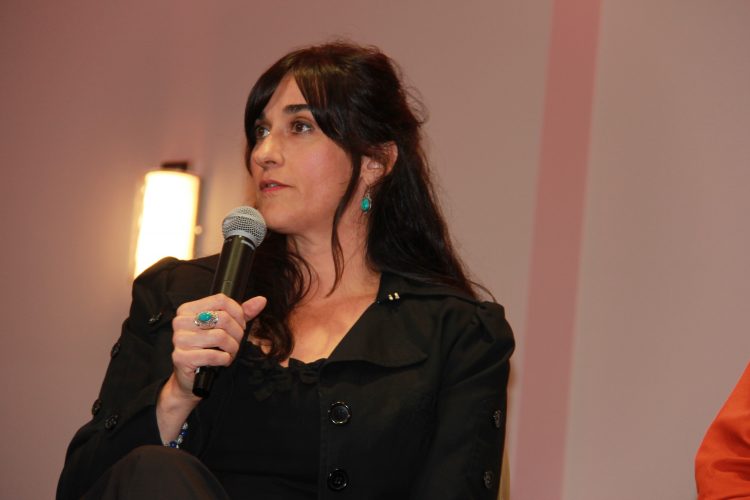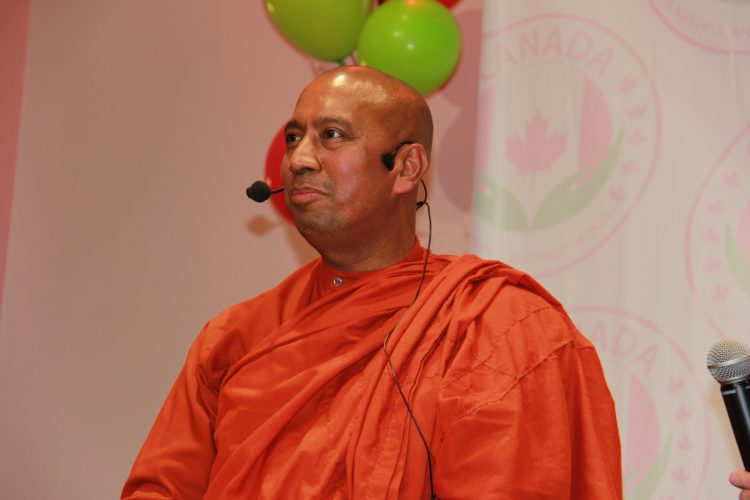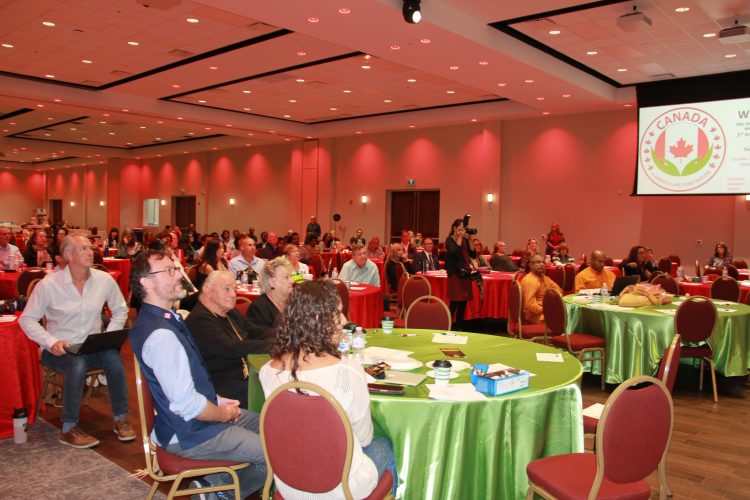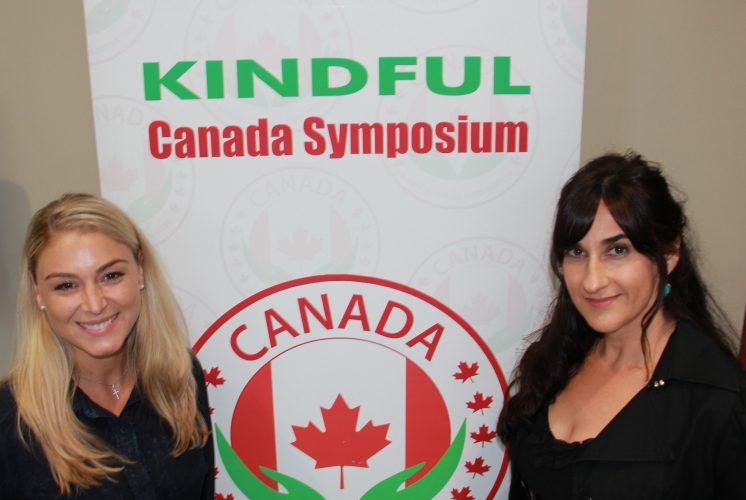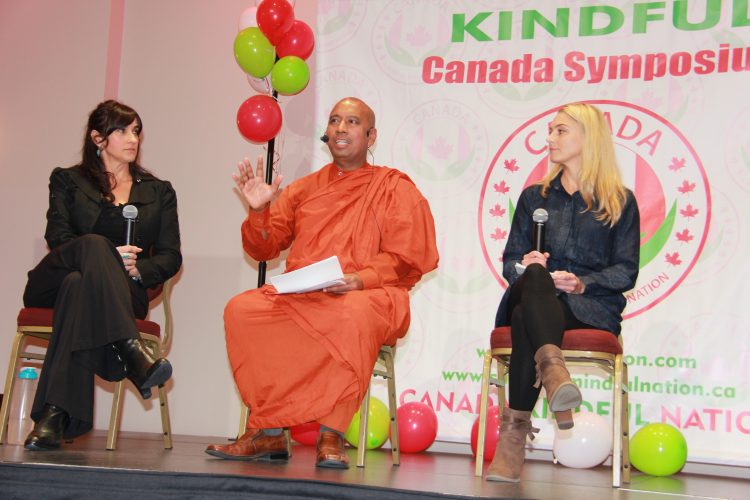
Features
Photo Gallery
Being ambassadors for mindfulness meditation in policing: Kindful Canada Symposium
Shifting the body out of the fight/flight/freeze response
October 31, 2019 By Const. Amy Boudreau, The Yoga Cop
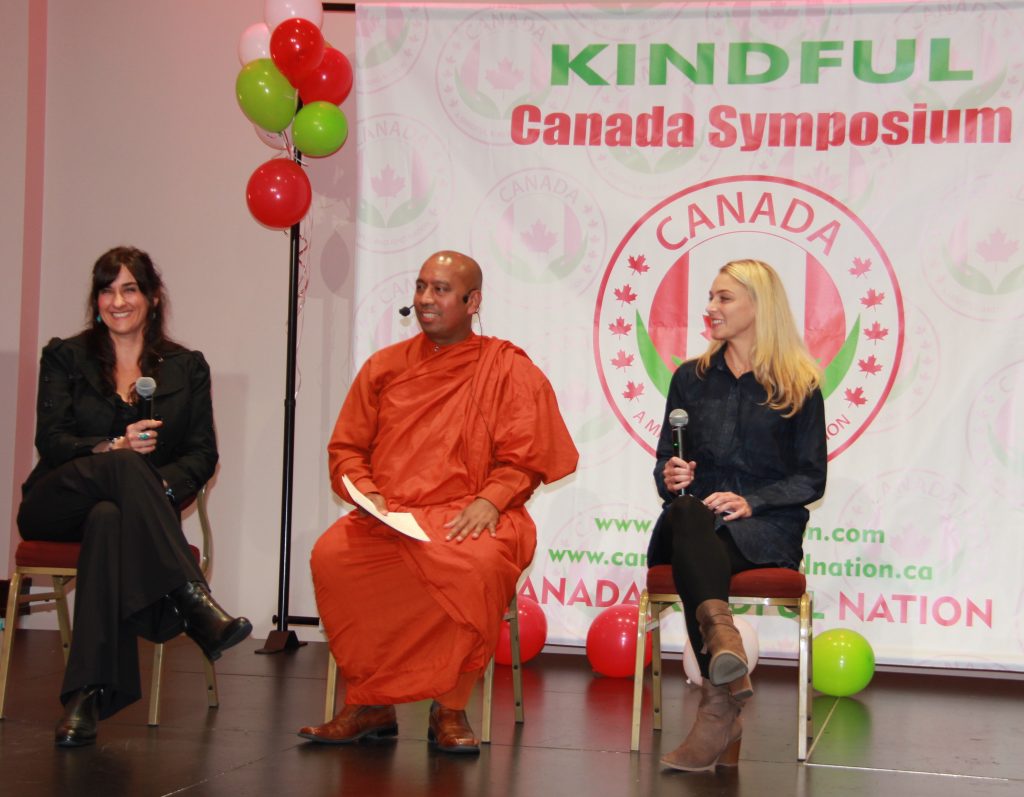 Left to right: Const. Stephanie Nassis, Venerable Dr. Bhante Saranapala, and Const. Amy Boudreau present a special panel discussion on “Mental Health and Wellness for First Responders."
Photo: R. Francoeur
Left to right: Const. Stephanie Nassis, Venerable Dr. Bhante Saranapala, and Const. Amy Boudreau present a special panel discussion on “Mental Health and Wellness for First Responders."
Photo: R. Francoeur “Choose to be optimistic, it feels better.”
– Dalai Lama
The third annual Kindful Canada Symposium invited several participants and speakers from a variety of disciplines to learn, network and have open conversations about the importance of physical and mental health through the promotion of mindfulness meditation.
Acknowledging the need for Canadian police officers to have better mental health support, this year’s symposium featured a special panel discussion on “Mental Health and Wellness for First Responders,” presented by Venerable Dr. Bhante Saranapala (@TheUrbanMonkTO), Const. Stephanie Nassis (@ZenCopTPS) and myself. I am known on social media as @TheYogaCop.
Personal stories were shared on the realities of stress and trauma for first responders, and how using mindfulness modalities such as yoga, breath exercises, and meditation have built resiliency while healing holistically to restore wellness.
A few key take-aways were:
- You don’t need to be broken to do the work, be proactive in self-care practices.
- Break the stigma at work by changing language to be more supportive. Stigma regarding mental injury persists and can be a barrier to accessing treatment.
- Resiliency can be enhanced through new recruit and on the job continual training.
- Police/first-responder culture needs to change from being resistant to help-seeking practices.
- Policing is limited to Peer Support Programs and Crisis Intervention Supports; more research is needed on operational stress injuries (OSI) and post-traumatic stress injuries (PTSI) as it relates to public safety personnel (PSP) in order to create effective evidence-based prevention strategies and treatment programs.
A little background: Understanding stress & trauma in the body
Our response to stress and trauma is an unconscious primal physical response. Our bodies change physiologically and chemically to get us away from danger, which is referred to as our fight/flight/freeze response. These responses can include increased heart rate, muscle tension, rapid breathing, hyperarousal and intense emotional triggers. These responses are instinctual to ensure our survival.
Stress has been defined as the disruption of an individual’s biological, psychological and social dimensions secondary to environmental challenges or perceived threats (Jeter, Slutsky, Singh, & Khalsa, 2015).
Trauma and stress are often remembered as a physical sensation in the body from our sensory input: sound, smell, sights. The amygdala in our brain acts as a smoke detector and either “activates” or “deactivates” these responses. In times of intense stress or trauma the amygdala essentially gets hijacked, which prevents our bodies from turning off these responses. Our bodies stop functioning properly and we unconsciously become “offline” mentally. When stress and trauma become trapped in your body it can manifest negatively, affecting your physical, mental and emotional wellbeing.
If left untreated in this state, we can start to:
- feel unsafe in our bodies because our bodies are a source of pain
- give up and not take care of ourselves
- have the inability to make decisions and have self-doubt
- feel like our mind is on constant replay or rewind (monkey mind jumping around)
- abuse alcohol or drugs in an attempt to numb our feelings
- become hypervigilant/hyperarousal (pacing, shaking, unable to sleep, not up to socializing, feeling disconnected, isolated, hiding)
- have thoughts of not wanting to live, inflict self-harm, or suicide
The use of asana (postures/yoga), pranayama (breath) and meditation are three ways to reconnect the mind with the physical body and discharge stored trauma and stress. Practicing mindfulness helps shift the body out of the fight/flight/freeze response by reorganizing a person’s perception of danger by connecting to their body sensations. It realigns the person’s self-regulation capabilities. Without self-regulation, you have to depend on external regulation sources from medication, drugs/alcohol, and/or constant reassurance.
Somatic therapies, such as these, focus on body-centred therapy that uses mind-body exercises and other physical techniques to help release the trapped tension left unresolved in your body from stress and trauma. Completing the cycle of stress/trauma through these practices provides a holistic way of healing.
Benefits of yoga/breath exercises/meditation:
- relaxes brows, shoulders, stomach cramps boosts energy/resiliency
- enhances ability to deal with stress/trauma completes cycle of trauma/stress in the body
- increases concentration/focus brings calmness/kindness
- helps master emotions improves difficulty sleeping
- rids body of toxic waste relives anxiety/depression/fear/pain
- lowers blood cortisol levels calms the mind/improves feelings of well-being
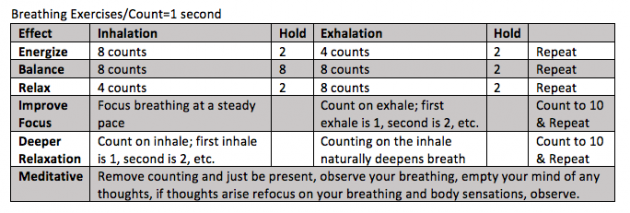
A University of Windsor graduate with a Bachelor’s Degree in Sociology, and a minor in Criminology and Psychology, Amy Boudreau has spent the last eight years as a Police Constable with a specialty in Crime Prevention. She holds a Professional Communications Certificate from the University of Toronto and has the International Crime Prevention Specialist (ICPS) designation. She is currently enrolled in a Leadership Certificate Program at the University of Waterloo, serves as a Mental Health Ambassador, and is an advocate for Health and Wellness.
References
Irwin M. Cohen, Amanda V. McCormick and Bob Rich (2019, Feb 8). Creating a Culture of Police Officer Wellness. Policing: A Journal of Policy and Practice, Volume 13, Issue 2, June 2019, Pages 213–229. Published by Oxford University Press. https://doi.org/10.1093/police/paz001
Tania Lutz (2019, July). Trauma-Sensitive Yoga Teacher Training: Healing Your Hero. Healing Heroes Organization, Power Yoga Canada City Centre. http://www.healingheroes.ca
West, J., Liang, B., & Spinazzola, J. (2016, July 4). Trauma Sensitive Yoga as a Complementary Treatment for Posttraumatic Stress Disorder: A Qualitative Descriptive Analysis. International Journal of Stress Management. Advance online publication. http://dx.doi.org/10.1037/str0000040
Buddha’s Light Center (2019, Oct). Meditation Training, Fo Guang Shan Temple of Toronto. Buddha’s Light International Association. www.english.fgs2.ca
Resources
Healing Heroes Organization – Is a holistic mind/body approach to healing trauma and PTSD for first responders and military personnel through Trauma Sensitive Yoga (TSY), Meditation and Breath (pranayama). Their mission is to alleviate the mental and physical symptoms of stress and stress related conditions, including post-traumatic stress. Call: (289) 681-1356, Email: tania@healingheroes.ca.
Canada: A Mindful & Kind Nation – Is an organization founded by Urban Buddhist Monk, Reverend Dr. Bhante Saranapala. He is a Global Public Speaker, Teacher of Mindfulness Meditation at the West End Buddhist Temple and Meditation Centre www.westendbuddhist.com, and a Spiritual Counsellor whose mission is to make Canada a more mindful and kinder nation by promoting mental health through mindfulness meditation and kindfulness practice. www.canadaamindfulnation.ca.
CALL TO ACTION
Participants are needed for current Canadian research studies examining factors that contribute to police stress & well-being across Canada:
1.McGill University Mindfulness Research Lab: “Sources of Occupational Stress in Law Enforcement Personnel”, visit Study Link: tinyurl.com/y3k5edpl to take the online survey.
Research Organizer: Matthew Fleischmann, MA (Forensic Psychology)
PhD Student, Counselling Psychology
Department of Educational & Counselling Psychology
McGill Mindfulness Research Lab
matthew.fleischmann@mail.mcgill.ca
www.mcgill.ca/mmrl
Follow Twitter: @MattFleisch1990 for further updates, training, and participant opportunities.
2. Canadian Institute of Public Safety Research and Treatment (CIPSRT) in partnership with the Canadian Institutes of Health Research (CIHR) has launched a Mental Wellness in Public Safety Team Grants funding opportunity, $20 million federal investment over five years, to support the development of new research evidence and tools needed to address existing and emerging gaps in post-traumatic stress injuries (PTSI) as it relates to public safety personnel (PSP) in Canada.
News Release (June, 2019): https://www.cipsrt-icrtsp.ca/blog/2019/06/18/cihr-launches-new-team-grants-mental-wellness-in-public-safety-competition/
The CIHR is supporting research to better understand, treat, and prevent PTSI in public safety occupations.
News Release (Feb, 2019): https://www.cipsrt-icrtsp.ca/blog/2019/02/08/government-of-canada-invests-more-than-11-million-in-research-into-post-traumatic-stress-injuries-in-public-safety-personnel/.
Research Organizer: Dr. R. Nicholas Carleton, Ph.D., R.D. Psych.
Professor of Psychology, Department of Psychology, University of Regina
Royal Society of Canada Inducted College Member
Scientific Director, Canadian Institute for Public Safety Research and Treatment (CIPSRT)
3737 Wascana Pkwy Regina, SK Canada S4S0A2 (306) 337-2473
Dr. Carleton’s research is supported by the Canadian Institutes of Health Research.
Visit www.cipsrt-icrtsp.ca and follow Twitter: @CIPSRT_ICRTSP for further updates, training, and participant opportunities.
Print this page
